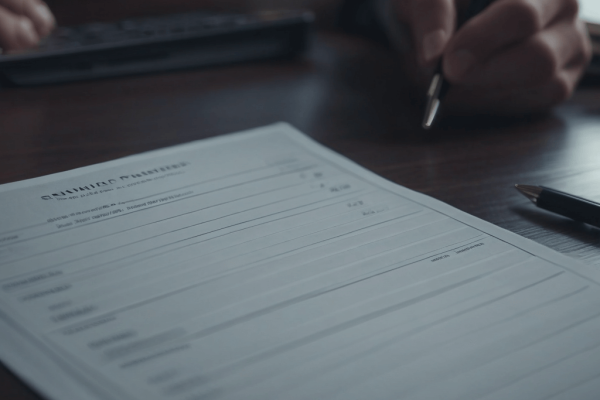In today’s consumer-driven world, managing personal finances can feel overwhelming. From bills, subscriptions, and everyday spending, keeping track of expenses can quickly become complicated. However, adopting minimalist principles can simplify the process, making expense tracking more efficient and less stressful. Minimalism in finance isn’t about deprivation—it’s about clarity, intentionality, and making your money work for you.
This article explores how to track expenses efficiently using minimalist strategies that will help you gain control over your finances, reduce stress, and make budgeting a straightforward and empowering part of your life.
1. Simplify Your Financial Accounts
A common problem many people face is having too many financial accounts. From multiple bank accounts, credit cards, and online payment platforms, it’s easy to lose track of where your money is going. One of the key tenets of minimalism is simplicity, and this applies to your finances as well.
Steps to Simplify Your Accounts:
- Consolidate Bank Accounts: If you have several bank accounts, consider consolidating them. Aim to have just one checking account and one savings account. This makes it easier to track your balances and reduces the complexity of moving money around.
- Limit Credit Cards: Having numerous credit cards can make it harder to manage debt and track spending. Choose one or two cards that offer the best rewards or benefits, and cancel or stop using the rest.
- Use One Payment Platform: If you’re using multiple online payment services (such as PayPal, Venmo, or digital wallets), try to stick to just one. This simplifies expense tracking and helps you avoid spreading your finances across too many platforms.
Pro Tip: Set up automatic transfers from your checking to your savings account to streamline savings efforts while keeping your finances minimal.
2. Prioritize Essential Expenses
Minimalism encourages a focus on the essentials, and this mindset is particularly helpful when tracking expenses. Start by identifying your essential expenses—those that you cannot live without. This usually includes rent or mortgage payments, utilities, groceries, transportation, and insurance. Once you have a clear understanding of your essentials, tracking becomes much easier as you filter out unnecessary expenses.
How to Identify Essential Expenses:
- List your recurring monthly expenses.
- Evaluate each expense to determine whether it is a “need” or a “want.”
- Prioritize needs, such as housing, food, and healthcare, over discretionary spending like entertainment or luxury items.
By separating essential from non-essential expenses, you gain a clearer view of where your money is going and can easily eliminate or reduce spending on non-essentials to increase savings or pay off debt.
Pro Tip: Use a color-coding system (either digitally or on paper) to distinguish between essential and discretionary spending. This visual cue helps simplify the tracking process.
3. Use a Minimalist Budgeting Tool
A minimalist approach to expense tracking requires a budgeting tool that’s both simple and effective. While there are countless apps and software available, some may feel cluttered or overwhelming. Instead, focus on using a tool that aligns with minimalism—something that is easy to navigate, tracks only what matters, and doesn’t require constant input.
Best Minimalist Budgeting Tools:
- Spreadsheet: A basic spreadsheet is one of the most minimalist and customizable ways to track expenses. You can create simple columns for income, essential expenses, non-essential expenses, and savings. This approach gives you complete control and eliminates unnecessary features.
- YNAB (You Need A Budget): This app focuses on assigning every dollar a job, ensuring that you live within your means and prioritize essential expenses. It’s user-friendly and focuses on simplicity, making it a great choice for minimalist budgeting.
- Mint: Mint is another excellent tool for minimalist expense tracking. It connects to your bank accounts and credit cards, automatically categorizing your transactions. You can set budget limits, track spending, and monitor your overall financial health in one place.
Pro Tip: Choose just one budgeting tool that works for you and stick with it. Constantly switching between apps or systems can create unnecessary complexity in managing your finances.
4. Automate Where Possible
Automation is a powerful tool for minimalists, as it eliminates the need for constant manual tracking of expenses. By automating key financial activities, such as bill payments and savings transfers, you can reduce mental clutter and avoid late payments or missed savings opportunities.
Ways to Automate Your Finances:
- Set Up Auto-Pay for Bills: Automate your recurring bills (rent, utilities, phone, etc.) to avoid late fees and reduce the time spent managing payments.
- Automate Savings: Schedule automatic transfers to your savings or investment accounts each month. This ensures that you’re consistently saving without needing to remember to do it manually.
- Automate Debt Repayments: If you’re working on paying off debt, automate your loan or credit card payments. This simplifies the process and ensures you’re steadily chipping away at your balances.
By automating your most important financial activities, you free up mental space and avoid unnecessary stress, allowing you to focus on more critical aspects of your financial health.
Pro Tip: Review your automated payments quarterly to ensure everything is still accurate and relevant, making adjustments if your financial situation changes.
5. Track Expenses Weekly
A minimalist expense tracking routine should be simple and regular. Instead of tracking every single expense in real-time, schedule a weekly review session where you categorize your expenses and evaluate your spending habits. This reduces the constant pressure of tracking and helps you stay organized without overcomplicating the process.
How to Conduct a Weekly Review:
- Review your bank and credit card statements.
- Categorize your expenses into essential and non-essential.
- Compare your spending against your budget.
- Identify areas where you may have overspent and plan for the following week.
By conducting weekly check-ins, you maintain awareness of your finances without feeling bogged down by daily expense tracking.
Pro Tip: Set aside a specific time each week (such as Sunday evening) to review your expenses and prepare for the upcoming week. Consistency is key to maintaining a minimalist expense tracking system.
6. Eliminate or Reduce Unnecessary Subscriptions
Subscription services are often one of the biggest contributors to hidden or forgotten expenses. With minimalism, the goal is to reduce unnecessary spending, and subscriptions are a prime target. From streaming services to monthly product boxes, it’s easy to lose track of what you’re paying for.
Steps to Declutter Subscriptions:
- Review All Subscriptions: Take inventory of all your recurring subscriptions. This includes digital services, magazines, apps, and memberships.
- Cancel What You Don’t Use: If you haven’t used a subscription in the past month, it’s likely unnecessary. Cancel any services that don’t add value to your life.
- Consolidate Services: If you’re using multiple streaming platforms or cloud storage services, consider consolidating them into one to save money and simplify your tracking.
Canceling unused subscriptions not only reduces clutter but also frees up money that can be better used toward savings, debt repayment, or essential expenses.
Pro Tip: Use an app like Truebill or Trim to help identify and manage your subscriptions. These apps can show you all your recurring payments and allow you to cancel unwanted services with ease.
7. Adopt the “One-In, One-Out” Rule
The “one-in, one-out” rule is a minimalist strategy that can be applied to both physical possessions and financial transactions. The idea is simple: for every new purchase or expense you introduce, one must be removed. This approach helps you stay mindful of your spending and prevents you from accumulating too many expenses.
How It Works:
- If you want to subscribe to a new service, cancel one of your existing subscriptions first.
- If you plan to buy a new clothing item, donate or sell an item you no longer wear.
- For every additional non-essential purchase, consider what expense you can cut back on to maintain balance.
This rule encourages intentional spending, helping you avoid the common trap of impulse buying or over-committing to new expenses.
Pro Tip: Use the “one-in, one-out” rule for larger purchases like gadgets, home goods, or furniture. It’s an excellent way to keep your home clutter-free and your spending under control.
8. Reflect on Your Financial Goals Regularly
Minimalism emphasizes living with intention, and that includes being intentional with your money. Regular reflection on your financial goals helps you stay aligned with your values and avoid unnecessary spending. When you know what you’re working toward—whether it’s building an emergency fund, paying off debt, or saving for a specific goal—you’re less likely to spend impulsively.
Steps for Financial Reflection:
- Set clear financial goals that reflect your priorities.
- Review your progress regularly, adjusting as needed.
- Eliminate expenses that don’t align with your financial goals.
By keeping your financial goals top of mind, you ensure that your spending habits support your long-term objectives, creating a sense of purpose and direction in your expense tracking.
Pro Tip: Use visual tools like a savings tracker or debt payoff chart to stay motivated and keep your financial goals in sight.
Conclusion
Tracking expenses efficiently with a minimalist mindset is all about simplifying the process, prioritizing what matters, and eliminating the unnecessary. By consolidating your accounts, automating key financial activities, adopting a weekly tracking routine, and staying intentional with your spending, you can gain control over your finances without feeling overwhelmed.
Minimalist financial habits not only reduce stress but also empower you to achieve your financial goals with clarity and confidence. Start by making small changes today, and soon you’ll find that managing your money is easier, more efficient, and less time-consuming.


